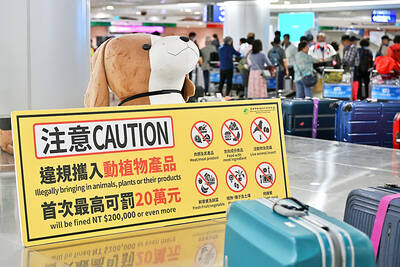A smiling Prime Minister Ariel Sharon was released from the hospital yesterday, saying he was in a hurry and fit enough to get back to work after suffering a mild stroke two days earlier.
Sharon returned to the fray just hours after his bitter rival, Benjamin Netanyahu, won the race to replace him as head of the battered Likud Party. Sharon quit the hardline Likud last month because it resisted his plan to move forward on a peace deal with the Palestinians.
Sharon's illness raised questions about his ability to lead his new party, Kadima, into March elections, and then lead the country if elected to a third term. Yesterday, the prime minister shrugged off those concerns.
"Now I have to rush back to work," he told reporters as he left Jerusalem's Hadassah Hospital. Asked if the stroke affected his performance, Sharon replied, "I don't think it will affect my functioning."
Sharon was rushed to Hadassah on Sunday evening and had not been seen or heard publicly since he was hospitalized. Doctors at Hadassah said the stroke briefly affected his speech, but didn't impair his memory or cognitive abilities, or leave permanent damage.
strong position
New polls yesterday showed Sharon -- Israel's most popular politician -- gaining ground after his stroke, with Likud still languishing. If poll trends hold, Kadima would be able to form a moderate coalition following the March balloting, and a Netanyahu-led Likud would head a right-wing opposition.
Sharon's exit from the Likud left behind a small group of lawmakers, like Netanyahu, who opposed his Gaza Strip withdrawal, and object to further territorial concessions to the Palestinians.
Netanyahu, a former prime minister, captured 44 percent of the vote in Monday's Likud primary, as against 33 percent for Foreign Minister Silvan Shalom. Two hardline candidates divided the remaining votes.
Netanyahu, who quit Sharon's Cabinet in protest just before the Gaza pullout, told cheering backers that his victory was the beginning of "returning the Likud to power."
"The country is facing difficult challenges, and I don't think it's headed in the right direction," Netanyahu said in a crowded room in party headquarters. "First of all, we must bring the Likud back to itself and then to the leadership of the country. It begins now, up, up and up."
Bethlehem incident
Meanwhile, Palestinian gunmen briefly seized Bethlehem city hall, overlooking the Church of the Nativity, yesterday in a jarring interruption to Christmas preparations in the traditional birthplace of Jesus.
The incident, five days before Christmas, was another sign of growing lawlessness in Palestinian territories and the turmoil within Palestinian President Mahmoud Abbas's Fatah faction ahead of next month's election.
About 20 gunmen from Fatah's al-Aqsa Martyrs Brigades fanned out on rooftops and in the offices of city hall, firing several shots in the air and forcing workers out. They demanded money and jobs for about 320 members.
Masked gunmen carrying assault rifles appeared beside the glittering star set up on the roof ahead of festivities.

UKRAINE, NVIDIA: The US leader said the subject of Russia’s war had come up ‘very strongly,’ while Jenson Huang was hoping that the conversation was good Chinese President Xi Jinping (習近平) and US President Donald Trump had differing takes following their meeting in Busan, South Korea, yesterday. Xi said that the two sides should complete follow-up work as soon as possible to deliver tangible results that would provide “peace of mind” to China, the US and the rest of the world, while Trump hailed the “great success” of the talks. The two discussed trade, including a deal to reduce tariffs slapped on China for its role in the fentanyl trade, as well as cooperation in ending the war in Ukraine, among other issues, but they did not mention

Japanese Prime Minister Sanae Takaichi yesterday lavished US President Donald Trump with praise and vows of a “golden age” of ties on his visit to Tokyo, before inking a deal with Washington aimed at securing critical minerals. Takaichi — Japan’s first female prime minister — pulled out all the stops for Trump in her opening test on the international stage and even announced that she would nominate him for a Nobel Peace Prize, the White House said. Trump has become increasingly focused on the Nobel since his return to power in January and claims to have ended several conflicts around the world,

REASSURANCE: The US said Taiwan’s interests would not be harmed during the talk and that it remains steadfast in its support for the nation, the foreign minister said US President Donald Trump on Friday said he would bring up Taiwan with Chinese President Xi Jinping (習近平) during a meeting on the sidelines of the APEC Summit in South Korea this week. “I will be talking about Taiwan [with Xi],” Trump told reporters before he departed for his trip to Asia, adding that he had “a lot of respect for Taiwan.” “We have a lot to talk about with President Xi, and he has a lot to talk about with us. I think we’ll have a good meeting,” Trump said. Taiwan has long been a contentious issue between the US and China.

Taiwan’s first African swine fever (ASF) case has been confirmed and would soon be reported to the World Organization for Animal Health (WOAH), Minister of Agriculture Chen Junne-jih (陳駿季) yesterday. The Ministry of Agriculture’s Veterinary Research Institute yesterday completed the analysis of samples collected on Tuesday from dead pigs at a hog farm in Taichung and found they were ASF-positive. Animal and Plant Health Inspection Agency Animal Quarantine Division chief Lin Nien-nung (林念農) said the result would be reported to the WOAH and Taiwan’s major trade partners would also be notified, adding that pork exports would be suspended. As of Friday, all samples